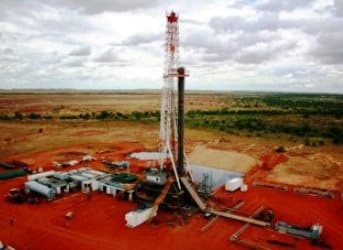“Cheap” shale natural gas domestic production is being touted worldwide as a panacea to expensive energy imports.
South Africa is one of the countries investigating the potential of indigenous natural gas production from hydraulic fracturing as an interim alternative to the rising costs of energy imports.
South Africa, the continent’s economic powerhouse, remains a net importer of energy with about 90 percent of its power supply being coal-based, with the result that any and all alternatives are under consideration.
While in April 2011 South Africa’s Department of Mineral Resources instituted an interim moratorium on hydraulic fracturing, it was lifted shortly thereafter, opening “fracking” to nationwide debate over the practice’s utility.
Now, Johannesburg's Open Society Initiative for Southern Africa has entered the debate, and its conclusions will not make for happy reading for the country’s energy concerns.
OSISA has bankrolled the production of a 55-minute documentary film and photo exhibition, “The High Cost of Cheap Gas,” which seems ready to have the impact of the U.S. documentary “Gasland” in the U.S., which more than any other media production, has influenced the debate over the controversial practice. According to director Jeff Barbee, “The High Cost of Cheap Gas” is intended to provide documentary material to underpin debate among the public and decision-makers about the genuine costs of South Africa’s proposed natural gas development, surveying its longer-term impacts on the environment, the country’s marginal water supplies and the human health and jobs costs.
Related article: US Energy Infrastructure Fails to Keep Pace with Boom
The documentary is certain to increase the controversy engendered by the 2011 DMR report, “Investigation of hydraulic fracturing in the Karoo Basin of South Africa,” which noted, "The study comprises reports written by specialists in their various fields as well as the results of a study tour to the United States which included field trips to Pennsylvania (Marcellus Shale) and Texas (Eagle Ford Shale) and visits to the Environmental Protection Agency and the Railroad Commission of Texas, both being US regulatory organizations directly involved with shale gas exploitation. The primary conclusion reached in this report is that South Africa’s regulatory framework must be robust enough to ensure that, if hydraulic fracturing associated with shale gas exploration and exploitation were approved, any resultant negative impacts would be mitigated. This will require a comprehensive review of the adequacy of the existing framework in order to identify any shortfalls or omissions and to ensure that it is sufficiently detailed and specific. The use of existing regulations from mature regulatory environments to inform the development of South African regulations in this matter is recommended.”
The stakes are immense – the DMR report notes in its Executive Summary, “The United States Energy Information Administration has made a first pass estimate of a technically recoverable resource of 485 trillion cubic feet (Tcf) of gas in the Karoo Basin.”
After giving the good news the report continues, “Whereas existing environmental regulations adequately cover most of these factors, an immediate and important concern requiring additional attention is water usage and disposal: in particular, the volume and transportation of the water, the potential contamination of water resources and the disposal of ‘used’ fracturing fluid. The use and disposal of water in such large amounts is expected to require a water use license under the National Water Act. Further research is required to investigate all potential sources of input water, as well as means of water disposal.”
Related article: Polish Shale Gas Hopes Hit Major Roadblock
And it is the water issue that might yet have the decisive impact on the country’s policies, as last autumn South African Minister of Mineral Resources Susan Shabangu commented on the report that further exploration in the Karoo Basin might hinge on hydraulic issues, commenting, "We are a water scarce country. If the process is such that there is a threat to water in South Africa, we would have to stop the process.” Interestingly, the official South African News Agency has had nothing to comment further since in the past eight months.
And, in a sign that the “global village” in the age of the Internet is becoming a reality, South African Jonathan Deal accepted the prestigious $150,000 Goldman Environmental Prize in San Francisco on 15 April for his attempts to secure a nationwide moratorium on fracking in South Africa as chairman of the Treasure the Karoo Action Group. Heartening tree-huggers worldwide, Deal, who told the media that he was not an environmental activist when he read a newspaper article two years ago about Royal Dutch Shell’s plans to obtain exploratory drilling permits in the area, said that he intends to use the award’s prize money to continue his initiative.
No doubt PR flacks in Johannesburg are going to be working overtime on this.
By. John C.K. Daly of Oilprice.com


















